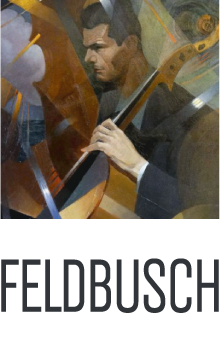Opus 47 Exil (1972)
… La musique d’Eric Feldbusch rend très bien l’atmosphère du poème. Une coloration vive et des lignes qui s’entrecroisent avec une grande indépendance créent au début une atmosphère tendue qui s’apaise ensuite et se transforme en une sorte de repos. Cette représentation a connu un grand succès, au même titre que l’ensemble des exécutants qui a proposé un programme excellent ». (ANON. Sources inconnues, Bruxelles 1972 ; copie d’un article de journal).
Opus 47 Exil (1972)
« … De muziek van Eric Feldbusch drukt de sfeer uit van het gedicht. Met scherpe kleuring en lijnen die elkaar kruisen met grote zelfstandigheid roept het werk in het begin een gespannen sfeer op om uit te lopen in een soort rust en bedaring. Dit tafereel met krachtige maar zeer evenwichtige accenten kende een groot succes net zoals het uitvoerende ensemble dat een uitstekend programma verzorgde. » (ANON. Ongekende bron, Brussel 1972 ; kopie van een krantartikel).
Opus 47 Exil (1972)
“The music of Eric Feldbusch invokes the atmosphere of the poem very well. Vivid colours and lines which intersect independently create, at the beginning, a charged atmosphere which then calms down and becomes a kind of repose. This representation has been very successful, just like all the performers who gave us this excellent programme. ” (Anon. Unknown source, Brussels 1972; copy of a newspaper article).
Poème de Saint-John Perse
Quatuor vocal et piano à quatre mains
Création à Bruxelles par l’Ensemble vocal Brahms (Nicole Welbes, Longrée, Vandendriesche et Audoan)
Extrait – uittreksel – extract

